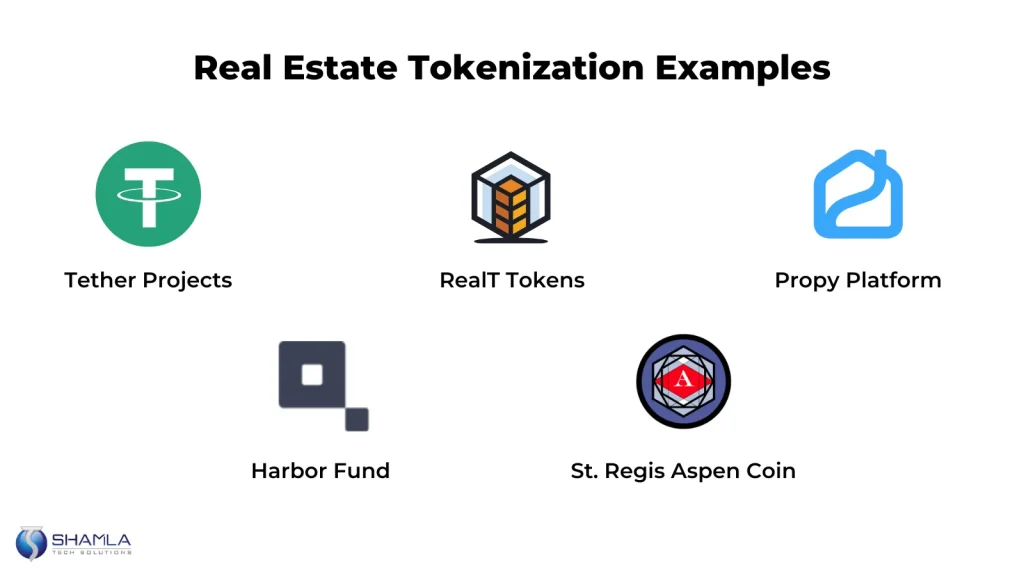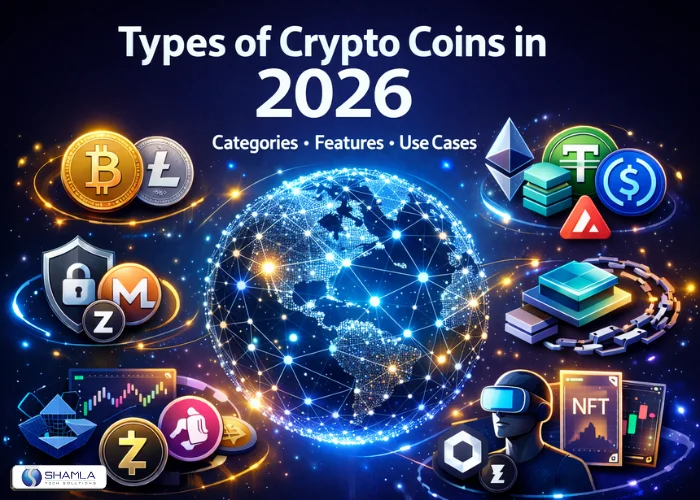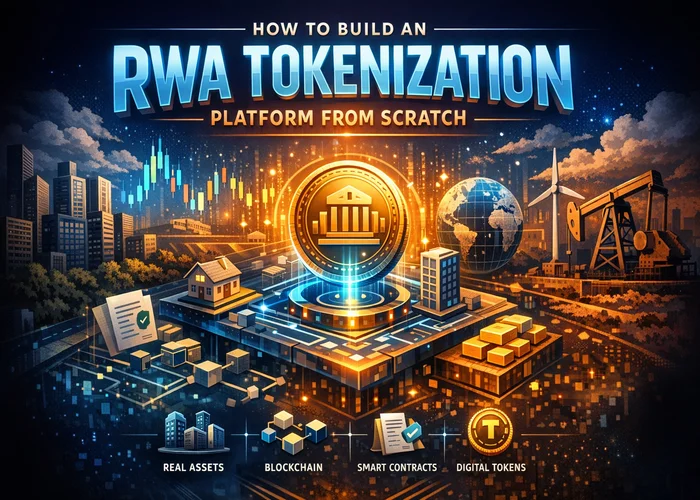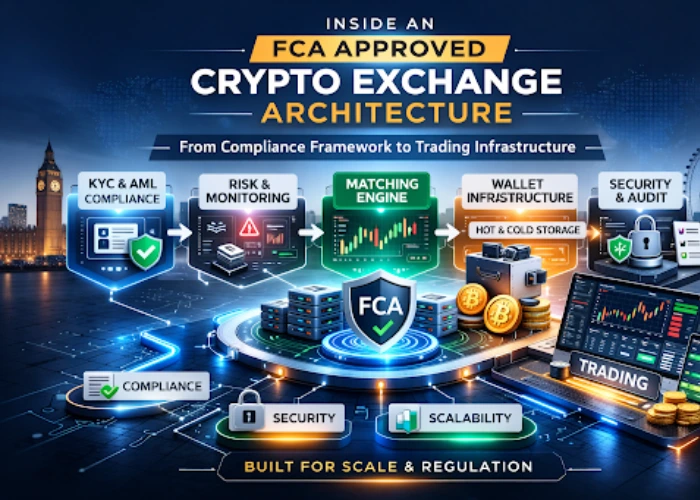What if owning a slice of a multi-million-dollar property in Malibu was as simple as clicking a button? Imagine if you have been bestowed the power to invest in high-value real estate, with as little as $100, and no middlemen getting involved.Real estate tokenization is doing just that, disrupting the entire real estate industry. And just to remind you, this isn’t a future concept; this disruption is happening right now, and if you’re looking to build a real estate tokenization platform or want to make investments in this space by hopping on early, you’re on the edge of something huge.
Keep reading to see why this technology is creating waves and how you can seize this amazon opportunity to rake up huge profits from the future of real estate.

What is Real Estate Tokenization and Why is it Ground Breaking?
Real estate tokenization simply converts real physical property assets into digital tokens. Each of these tokens will symbolize a fractional stake in the property that was tokenized. Unlike the old and traditional ownership models that require you to come up with hefty upfront investments, tokenization helps you by dividing a property’s value into smaller, tradeable units, allowing investors to easily buy, sell, or trade these stakes on blockchain platforms. This shift to digital ownership opens new doors to a completely new era of property investment, making it possible for anyone, from small-scale investors to large institutions, to partake in the real estate market without the need for any massive capital or middlemen.
Tokenized real estate is actually part of the larger trend of Real World Asset Tokenization, where other real tangible assets like art, commodities, and real estate can be easily digitized on the blockchain. This RWA tokenization significantly improves liquidity and also reduces barriers to entry into these markets. This brings in greater efficiency, transparency, and security to the real estate market. As the real estate market continues to mature, tokenization is definitely set to disrupt the whole traditional property trading by enabling us with amazingly faster transactions, lower costs, and fractional ownership, which will make high-value real estate to be much more accessible and super flexible for investors worldwide.
Another fascinating statistic is that the market for real estate tokenization is growing rapidly too. According to a report by PwC, the tokenized real estate market is expected to exceed $1.4 billion by 2027, which displays us with a major shift in how real estate is bought and sold. Tokenization is also redefining crowdfunding and fundraising in the real estate industry as fractional ownership allows a high volume of investors to participate and for developers to raise capital more efficiently.
How Real Estate Tokenization Works?
The real estate tokenization process is pretty much straightforward with very simple protocol in place. The first step in this process is to choose the real estate asset that has to be tokenized. After selecting the asset, it is then assessed and its value will be divided into small cryptographic tokens which can then be bought and sold by traders on the blockchain platforms. All these tokens will be mostly issued through Initial Coin Offerings (ICOs) or Security Token Offerings (STOs).
Once the property is being tokenized, the next step usually would be the initiation of the smart contracts to automate the buying, selling, and transferring of the tokens. These smart contracts are actually self-executing in nature that are being coded to execute transactions once all the specific conditions are met, which makes sure that the whole process is fast, efficient, and error-free. These contacts also allow for better security in the transactions being conducted without the need of any kind of intermediaries, which cuts down the costs involving transitions and eliminates all kinds of human error too. The use of these automated agreements also promotes transparency and trust among investors, as all terms are predefined and visible on the blockchain, with no room for any manipulation.
After being tokenized and listed, the real estate asset will then be made available for trade on various blockchain-based exchanges. Here is where buyers are given the access to purchase property tokens that represent fractional ownership of the asset that was tokenized, with each token granting the owner a proportionate stake in the property. The liquidity created by these tokenized assets increases market efficiency by a lot, allowing assets to be bought, sold, or transferred with ease and reducing the traditionally slow and rigid real estate transaction processes.
Security and Transparency are fundamental components of the real estate tokenization process. Each transaction and token ownership record is securely stored on a blockchain ledger, which makes sure that the history of ownership is completely immutable and transparent. This decentralized ledger prevents any kind of fraud from occurring and also confirms that all the parties involved in a transaction have the access to verifiable, real-time data. The blockchain’s encryption guarantees that tokenized assets are also safe from cyberattacks and tampering, providing both investors and property owners with peace of mind. Additionally, the use of multi-signature wallets further increases the rigidity of the security of tokenized property transactions.

How to Get Started with Real Estate Tokenization?
If you’re ready to jump into the world of real estate tokenization, the first thing that you need to have is the basic understanding of the basic technology behind it, all of which is blockchain. You should get familiar with how digital tokens can represent ownership of real estate and how blockchain makes sure that there is security, clarity, and the ability to trade. Start by looking into platforms that offer phenomenal real estate tokenization services, where you can turn properties into tokens and handle transactions in a safe manner. It’s also important for you to learn about smart contracts, as they will help you to automate the process of buying, selling, and transferring ownership of tokenized properties.
So, first pick a platform or blockchain network that supports real estate tokenization. Popular blockchain networks like Ethereum and Polkadot are often used for tokenizing real world assets because they are strong and superbly reliable. These networks also allow you to create security tokens through Security Token Offerings (STOs), which follow rules for securities, allowing you to legally trade tokenized property without any hurdles along the journey. When choosing a platform, it is also super important to make sure that it offers useful features like fractional ownership, where investors can buy part of the property, and includes smart contract features to make transactions easier and automatic.
Once this is done, you can start finding the real estate properties to turn into tokens. You’ll need to check the value of the property, as this value will be divided into parts, with each token representing part of the property’s ownership. It’s also important to work with a legal advisor to make sure that the property follows the right laws, especially if you’re in an area with special rules for real estate tokenization. Make sure that your platform has tools to help you divide the value of the property into digital shares correctly.
Next, you’ll need to create the digital tokens. This is usually done through an Initial Coin Offering (ICO) or Security Token Offering (STO), where you give the tokens to potential investors. The tokens represent part ownership in the property, and the creation of these tokens will follow smart contracts that automatically make sure ownership rules and transaction terms are followed. The creation of these tokens will use special checks, making sure that each token is unique and can’t be in any way changed or copied. Smart contracts will also take care of things like sharing rental income or profits from selling the property, giving token holders a passive income too.
Once your tokens are ready, you can list them on a tokenized asset exchange or blockchain-based marketplace. You’ll want to make sure your property is available for investors who want to diversify their portfolio by owning part of real estate. These exchanges make it easier to buy and sell shares in tokenized properties, which increases the ability to trade assets that are hard to trade normally. By listing your property on these platforms, you can reach a global group of investors, expanding your market and raising money faster than traditional ways.
Throughout this entire process, always remember that following the rules is very important. You must follow both local and international laws about securities, taxes, and real estate transactions. It’s a good idea to have a deep understanding of the legal framework of real world asset tokenization and we also advise you to work with experienced legal and financial experts to help you handle these rules. Along with following the rules, you should make sure your platform has strong security measures, such as special wallets and encryption, to protect your investors’ funds and transactions from cyber threats.
Real Estate Tokenization Examples

1. Tether's Tokenized Real Estate Projects
Tether, known for its stablecoin USDT, has ventured into real estate tokenization. It has partnered with real estate developers to tokenize luxury properties. By using blockchain, Tether divides these high-value assets into small, tradable tokens. These tokens represent fractional ownership, allowing investors to buy into high-end real estate without significant capital. The project promotes greater liquidity and transparency, enabling easier transactions, quicker deals, and offering global access to these prime properties. This approach is a major step toward democratizing real estate investments.
2. RealT Tokenized Properties
RealT is a well-known example of how blockchain technology can change property investments. They turn single-family homes in the United States into tokens, allowing anyone to invest in small parts of these properties. Investors can buy RealTokens, which represent shares in real properties. Each token gives the holder a share of the rental income and any increase in the property’s value over time. RealT uses blockchain to make property ownership completely clear, and it allows easy trading on secondary markets. This model removes traditional barriers to real estate investing, like geographic limits and the need for a lot of money, making it easier for more people to invest in property.
3. Propy’s Blockchain-based Real Estate Transactions
Propy, another platform, uses blockchain to make real estate transactions easier. It allows international property buyers to complete the whole buying process online. Propy tokenized a luxury property in California, letting buyers to own small parts of it through the blockchain tokens. The whole process, from choosing the property to making the payment, was done with the use of smart contracts, so there was no need for middlemen in the whole process. Propy’s idea built trust, reduced fraud, and sped up the buying process, making global property transactions to be much safer and more efficient.
4. Harbor’s Tokenized Fund Offering
Harbor, a well-known platform that focuses on security token offerings (STOs), has turned a real estate fund into tokens. This fund, backed by a collection of properties, now lets people buy small pieces of ownership through blockchain tokens. With the conversion of the fund’s shares into tokens, Harbor made it much easier for smaller investors to join the real estate markets that were once only available for wealthy individuals. The use of blockchain technology makes sure that all these investments are always safe, clear, and easy to track, giving investors the right kind of trust and confidence. Also, this method offers liquidity through secondary trading, something that traditional real estate investments usually can’t provide.
5. The St. Regis Aspen Resort Tokenization
In another example of tokenization, the St. Regis Aspen Resort, a luxury hotel in Colorado, became one of the first high-end hotels to turn ownership shares into digital tokens using blockchain technology. The resort allowed people to easily invest by converting the property shares into simple digital tokens. Each token represented a part of the hotel’s total value and allowed token holders to receive payments from the hotel’s earnings. This change made the real estate market to be more flexible, giving more people the amazing chance to invest in expensive hotels. It also gave investors a clearer, safer, and more straightforward way to invest in real estate.
How to Develop a Real Estate Tokenization Platform?
To successfully build a real estate tokenization platform, the very first step that needs to be taken is to fully understand blockchain technology and how it works with real estate assets. As we previously discussed, it is a must that you’ll need to choose a simple blockchain framework, like Ethereum, Stellar, or Polkadot, that supports smart contracts and also includes token standards like ERC-20 or ERC-721. Smart contracts are very important for this process because of the automation and simplification of the process of transferring ownership, managing fractional shares, and setting rules between investors. Setting up a strong, reliable blockchain system will play a key role in making sure that your platform continues to work well and can grow easily too.
Once you have the blockchain system ready, the next important step is to define the asset tokenization model that will best fit your platform. You’ll need to decide if you want to tokenize whole properties or break them into smaller, easier-to-sell shares. Tokenizing a property means creating a digital asset that shows ownership of the property, which can be traded, bought, or held by investors. These tokens must follow the rules and laws and match the property’s value. You’ll also need to include systems that ensure your platform follows SEC regulations, especially when dealing with Security Token Offerings (STOs).
The third important step is to create a user-friendly interface (UI) and a smooth user experience (UX). The goal is to make it easy for users to look at tokenized properties, buy parts of them, and track their assets on the blockchain. The interface should work smoothly with the backend blockchain for handling transactions, smart contracts, and wallets. User registration and identity checks are very important for following Know Your Customer (KYC) and Anti-Money Laundering (AML) rules, which are needed in most places around the world.
The fourth step is to set up strong security measures to protect both the assets and user information. You should use encryption, multi-signature wallets, and two-factor authentication (2FA) to stop unauthorized access and keep transactions safe. Also, it’s important to set up a safe and secure way of issuing tokens, so each token is traceable and follows the law. Blockchain’s built-in security helps reduce the risk of data tampering and hacking, but these extra security steps will give users more confidence in using your platform.
Real estate tokenization is one of the five industries being reshaped by real-world asset tokenization. To maximize the potential and to make sure that your platform continues to achieve success and legal safety, it’s super important for you to build strong partnerships with legal experts and financial institutions. This helps you to make sure that compliance is being followed with securities laws, tax regulations, and global market rules. Developing good relationships with real estate developers, investors, and exchanges will also be key to maintaining liquidity on your platform and fostering an active market for tokenized assets. Once these foundational elements are in place, you can easily improve your platform with services such as property management tools, asset valuation systems, and auditing software, offering users an effective solution for real estate tokenization.

Why Choose Real Estate Tokenization Development Services?
When developing your own real estate tokenization platform you really need to make sure that you get things right from the start, and this is where real estate tokenization development services come in handy. The whole process will involve blockchain systems, smart contracts, creating tokens, and you have to be sure you follow all the rules. Without any kind of expert help, you could probably end up wasting a lot of time and money, worst case – your real estate tokenization project could go down the drain. By choosing these specialized services, you can hire developers who are well-experienced in these development cycles and who know exactly how to make the process much easier and faster for you.
The main reason to choose these services is that you get a team that completely understands the details of real estate tokenization. From picking the right blockchain for your project, whether it’s Ethereum, Polkadot, or another option, to setting up your tokenomics and creating smart contracts, these services know what works and what doesn’t. Their knowledge makes sure your tokenized real estate platform will be safe, able to grow, and fully follow the rules, both locally and globally. But beyond the technical side, these services also offer important tools and resources to help everything run smoothly. They come with tested frameworks, so you don’t have to start from scratch. Need blockchain integrations? Done. Want to set up smart contracts? They’ve got it covered. These experts understand the latest trends and rule changes in the real estate and crypto markets, so your platform is ready for the future.
Also, the whole development process goes much faster when you work with an experienced team. They can get your platform running in much less time than an in-house team or someone with less experience. These experts use ready-made templates and blockchain solutions, so development takes less time and there’s less chance of mistakes. When you choose real estate tokenization experts, you also get resources and support that you won’t get elsewhere. They help with legal rules, set up digital wallets, and give you regular updates to keep your platform safe and adaptable. The knowledge these professionals have can help you handle challenges like international transactions, sharing ownership, and token distribution, so you can avoid mistakes that others often make.
In short, choosing real estate tokenization development services is a smart move. You save time, reduce risks, and launch a platform that’s safe, able to grow, and ready for the future. Whether you’re working on creating tokens, connecting with blockchain, or following financial rules, these services give you the help and support you need to succeed in a growing market.
How Shamla Tech Can Help Build Your Real Estate Tokenization Platform?
Shamla Tech, a real estate tokenization development company is leading the way in real world asset tokenization development, using our strong expertise to build advanced real estate tokenization platforms. With years of experience, we’ve successfully worked with companies from around the world, helping them turn their real estate assets into digital ones and bring them onto the blockchain.
Through our simple process, we make sure your platform is built using the latest blockchain technology, with smart contract automation to offer an efficient and scalable solution. Shamla Tech provides a full range of real estate tokenization platform development services, making the complex world of real estate tokenization much easier and accessible. When you work with us, you get a trusted partner who understands the details of tokenization and is ready to help turn your idea into reality.









